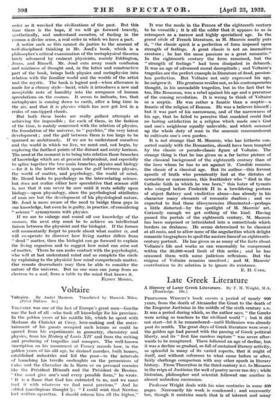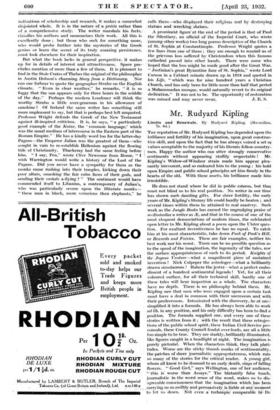Late Greek Literature
A History of Later Greek Literature. By F. M. Wright, M.A. (Routledge. 18e.)
PROFESSOR Wmeires book covers a period of nearly um years, from the death of Alexander the Great to the death of the Emperor Justinian in the middle of the sixth century A.D. It was a period during which, as the author says, " the Greeks were acting as teachers to the civilized world " ; but it did not start—let it-be remembered—until Hellenism was already past its zenith. The great days of Greek literature were over ; the golden age had passed with the passing of Greek political liberty, and its " first fine careless rapture " was never after- wards to be recaptured. There followed an age of decline, but it was a decline so gradual, so full of sustained literary activity, so splendid in many of its varied aspects, that it might of itself, and without_ reference to what came before or after, fairly challenge comparison with any other epoch in literary history. From Theocritus in, the third century B.c. to Musaeus in the reign of Justinian the well of poetry never ran dry; while historian, philosopher and scientist followed one another in almost unbroken succession.
Professor Wright deals with his nine centuries in some 400 pages. _Necessarily his work is condensed ; and necessarily too, though it contains much that 'is of interest and many indications of scholarship and research, it makes a somewhat disjointed whole. It is in the nature of a .precis.rather than of a Comprehensive study. The writer marshals' his facts,' classifies his authors and summarizes their work. All this is excellently done ; but those who seek for something more, who would probe further into the mysteries of the Greek genius or learn the secret of its truly amazing persistence, must look elsewhere for their inspiration.
But what the book lacks in general perspective, it makes up for in details of interest and attractiveness. Space pre- cludes mention of more than a few of them. It is pleasant to find in the Stoic Crates of Thebes the original of the philosopher in Austin Dobson's charming Story from a Dictionary. Nor can one forbear to quote the geographer Strabo on the English climate. " Even in clear weather," he remarks, " it is so foggy that the sun appears only for three hours in the middle of the day." Perhaps the modern Londoner will think the worthy Straho a little over-generous in his allowance of sunshine ! Of Ireland the same writer has something still more unpleasant to say, but that is perhaps best left unquoted. Professor Wright defends the Greek of the New Testament against ill-inspired criticism. It is, he says, " a particularly good example of the Koine, the ' common language,' which was the usual medium of intercourse in the Eastern part of the. Roman Empire." He has a kindly word too for the latter-day Pagans—the Emperor Julian was the greatest of them—who sought in vain to re-establish Hellenism against the flowing tide of Christianity. Thackeray had the same feeling before him. " I say, Pen," wrote Clive Newcome from Rome, " I wish Warrington would write a history of the Last of the Pagans. Did you never have a sympathy for them as the monks came rushing into their temples, kicking down their poor altars, smashing the fair calm faces of their, gods, and sending their vestals a-flying ? " The sentiment would have commended itself to Libanius, a contemporary of Julian's, who was particularly severe upon the illiterate monks- " these men in black, more voracious than elephants," he
calls them—who displayed their religious zeal by destroying statues and wrecking Alines.
A proniineitt figure'at the end of the period is that of Paul the Silentiary, an official of the Imperial Court, who Wrote (among other works) two long poems descriptive of the Church of St. Sophia at Constantinople. Professor Wright quotes a few lines from-one of them; they are enough to remind us of the grievous loss suffered by Christendom when this famous cathedral passed into other hands. There were some who hoped that the loss might be made good after the Great War.
Justinian's great Byzantine fane of St. Sophia," wrote Lord Curzon in a Cabinet minute drawn up in 1918 and quoted in his Life, " which was for nine hundred years a Christian Church, and has only been for little more than half that period a Muhammadan mosque, would naturally revert to its original dedication." It was not to be. The opportunity of restoration was missed and may never recur. J. E. S.







































 Previous page
Previous page